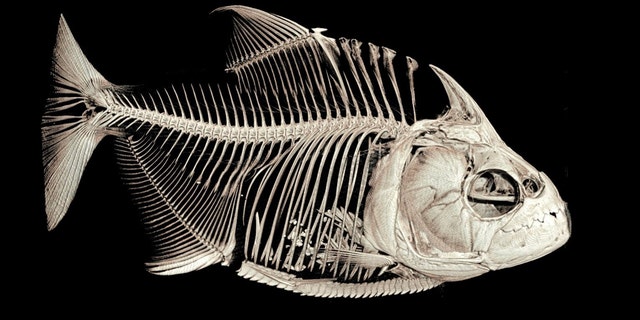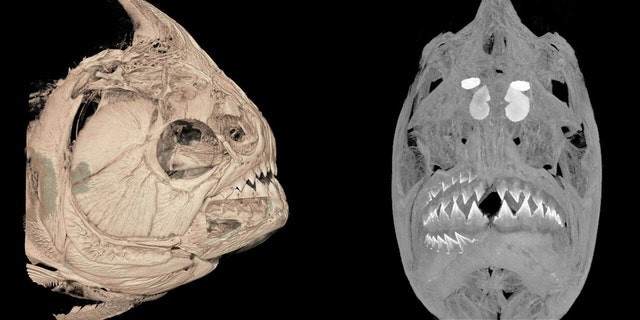Piranha teeth stun researchers after amazing discovery
Piranha teeth stun researchers at the University of Washington after their amazing discovery.
Piranhas are notorious for their razor-sharp teeth, but a new study of the dangerous fish has surprised researchers, revealing just how remarkable their teeth actually are.
The research notes that the fearsome fish, which are omnivores, are able to regenerate rows of teeth simultaneously. The teeth are also interlocked, which makes them act as a single unit, researchers discovered.
"The teeth form a solid battery that is locked together, and they are all lost at once on one side of the face," said one of the study's co-authors, Adam Summers, in a statement. "The new teeth wear the old ones as 'hats' until they are ready to erupt. So, piranhas are never toothless even though they are constantly replacing dull teeth with brand new sharp ones."

1 / 1A CT-scanned image of the piranha Serrasalmus medinai. Note the ingested fish fins in its stomach. (University of Washington)
FLESH-EATING PIRANHA-LIKE FISH'S 150-MILLION-YEAR-OLD REMAINS DISCOVERED IN GERMANY
"I think in a sense we found a solution to a problem that's obvious, but no one had articulated before," Summers added, referring to the issue of how piranahas regenerate teeth.
Piranhas regenerate their teeth multiple times throughout their lives.
The researchers used a CT to scan different piranhas to make the observation that it becomes hard to replace a single tooth, a discovery that the study's lead author, Matthew Kolmann, likened to "a missing link in an assembly line."

A CT-scanned image of the piranha Serrasalmus medinai. Note the ingested fish fins in its stomach. Credit: University of Washington
"With interlocking teeth, the fish go from having one sharp tooth that can crack a nut or cut through flesh to a whole battery of teeth," said another co-author, Karly Cohen, in the statement. "Among piranhas and pacus there's a lot of diversity in how the teeth lock together, and it seems to relate to how the teeth are being used."
The study has been published in the scientific journal Evolution & Development.
CLICK HERE TO GET THE FOX NEWS APP
Source: Read Full Article

